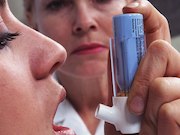Daily inhaled dose tied to improvements in FEV1 compared to placebo
THURSDAY, Sept. 7, 2017 (HealthDay News) — Tiotropium appears to be effective at improving lung function in patients with mild to moderate chronic obstructive pulmonary disease (COPD), according to a study published online Sept. 6 in the New England Journal of Medicine.
Yumin Zhou, M.D., Ph.D., from the First Affiliated Hospital in China, and colleagues randomly assigned 841 patients with mild or moderate COPD to receive a once-daily inhaled dose (18 μg) of tiotropium (419 patients) or a placebo (422 patients) for two years.
The researchers found that in patients who received tiotropium, forced expiratory volume in 1 second (FEV1) was higher than in those who received placebo throughout the trial (P < 0.001 for all comparisons). There was no significant improvement in mean annual decline in the FEV1 before bronchodilator use (difference, 15 ml per year; P = 0.06). However, after bronchodilator use the annual decline in the FEV1 was significantly less in the tiotropium group than in the placebo group (difference, 22 ml per year; P = 0.006). The groups were similar with regard to the incidence of adverse events.
“In conclusion, this trial showed that tiotropium was effective in improving lung function and quality of life and resulted in a lower frequency of acute COPD exacerbations than placebo among patients with GOLD stage 1 or 2 disease. Whether early intervention with tiotropium alters the long-term course of COPD remains an open question,” conclude the authors.
The study was funded in part by Boehringer Ingelheim.
Copyright © 2017 HealthDay. All rights reserved.








